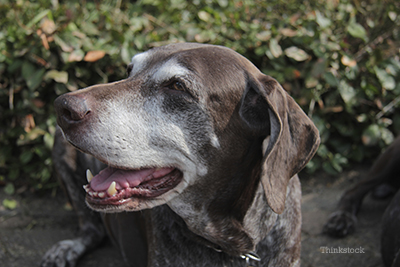
Just as we all want to live long productive lives, we all want our pets to live long and happy lives too. Many dogs live healthy active lives far longer than they did in the past. According to Pets.ca, “The average life span of the North American or European dog is 12.8 years. This is a large increase in life span over the past 100 years and is mostly attributable to better food and better medical care.” Older dogs, just like older people, undergo a variety of aging and degenerative conditions due in large part to the passing of years -- the older dog is undergoing many physiologic changes. The metabolism and aging process changes occur at different ages depending in large part on the type of dog. Some of these factors are unavoidable. Others can be managed with diet.
What is the definition of an older dog?
Generally consider a dog to be 'older' if he is in the last third of his normal life expectancy. But just as in people where “age is just a number,” many dogs seem younger than their age would indicate. For example, an active alert and playful 10 year-old Beagle may be physically younger than a 10 year-old Great Dane in spite of the same age. Today it is not uncommon for small breeds to live 20 years and even giant breeds to live 10-12 years1.
Dogs are living longer for a number of reasons including better preventive and therapeutic vaccines, parasite control products and diagnostics and treatments. In addition, animal nutrition experts have developed a greater understanding of dietary needs to help with health and disease as well as differences that occur throughout life in youth and old age.
Many changes develop and progress in dogs as they age including deterioration of skin and coat, loss of muscle mass, more frequent intestinal problems, arthritis, obesity, dental problems and decreased ability to fight off infection.
How do nutritional requirements vary with age?
According to a scholarly article out of Baskent University in Turkey, “a positive nutrition attitude is the most important factor that improves the life quality in especially the progressing ages.”
According to the ASPCA, “The main objectives in the feeding of an older dog should be to maintain health and optimum body weight, slow or prevent the development of chronic disease, and minimize or improve clinical signs of diseases that may already be present.”

What are the most important nutrients for older dogs?
With advancing age, the optimal range for key nutrients becomes narrower, making it easier to dip into dietary deficiencies or excesses.
Water: Undoubtedly the greatest nutritional concern for older dogs is adequate water intake. Older dogs may not drink enough water resulting in dehydration and even mild dehydration can worsen existing conditions.
Protein: Protein requirements for older dogs do not decrease with age and protein levels do not contribute to the development or progression of renal failure. It is important to feed older dogs diets that contain optimum levels of highly digestible protein to help maintain good muscle mass.
Fat: Older animals have a tendency to gain weight in the form of fat. It is important to reduce fat content.
Minerals: Sodium and Potassium are important in the maintenance of heart and kidney health. Damage can be done by over supplementation. This is particularly true for calcium and phosphorus, because the proportions of these two minerals must be supplied to the dog in the proper ratios for nutritional health.
Carbohydrates: Always good for extra energy.
What about vitamins, minerals and other supplements for old dogs?
Minerals: Like vitamins, minerals are supplied in the correct proportions in “Complete” and “Balanced” commercial dog foods. Damage can be done by over supplementation. This is particularly true for calcium and phosphorus, because the proportions of these two minerals must be supplied to the dog in the proper ratios for nutritional health.
Vitamins: If you are feeding a well-balanced commercial diet that meets AAFCO guidelines there is no need to supplement vitamins and minerals in a healthy dog regardless of their age. Supplements specifically focusing on older pets are of no scientifically proven value. Nutritional supplements should be directed to address specific needs not recommended just because of age.
Dogs who insist on an unbalanced diet or who have chronic urinary tract disease or gastro-intestinal problems may have problems balancing their diet and so they may benefit from the addition of water and fat-soluble vitamins.
Anti-Arthritics: According to the Journal of Veterinary Internal Medicine2, the evidence of efficacy of nutraceuticals is poor, with the exception of diets supplemented with Omega-3 fatty acids in dogs3. Omega-6 fatty acids can help maintain skin and coat health. Omega-3 fatty acids have been recommended for arthritis.
Probiotics: Increasingly pet owners are being advised to supplement their dog’s diets with probiotics (a beneficial bacteria that helps ward off bad bacteria)4. The Mayo Clinic says that in people, “Although more research is needed, there's encouraging evidence that probiotics may help treat diarrhea, especially following treatment with certain antibiotics, prevent and treat vaginal yeast infections and urinary tract infections, treat irritable bowel syndrome, speed treatment of certain intestinal infections and even prevent or reduce the severity of colds and flu.” It is worth remembering that while scientific evidence of the value of probiotics is limited we do know they are unlikely to cause harm. Learn more about probiotics >>
Questions to ask your veterinarian
- Should I give my dog a balanced vitamin and mineral supplement?
- My dog has a long standing kidney disease. Should he be given vitamins?
If you have any questions or concerns, you should always visit or call your veterinarian -- they are your best resource to ensure the health and well-being of your pets.
References
- "Nutritional Needs of Senior Dogs." Pet Education.com. Web.
- "Systematic Review of Efficacy of Nutraceuticals to Alleviate Clinical Signs of Osteoarthritis." Journal of Veterinary Internal Medicine 26.3 (2012): 448-56. Print.
- "What Are Nutraceuticals?" News-Medical.net. 19 July 2011. Web.
- "Probiotics Are Your Dog's Best Defense Against Disease." Healthy Pets. Mercola.com, Web.
